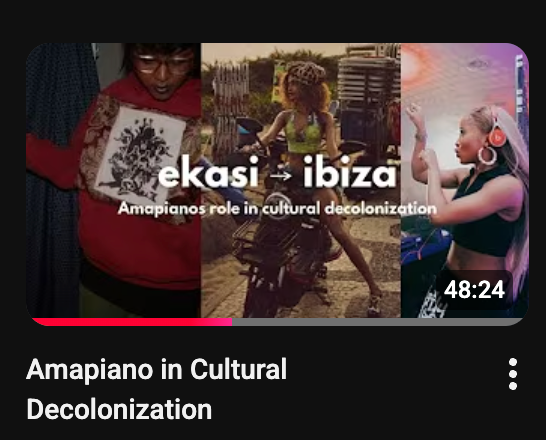Amapiano and the Politics of Sound: From Kwaito to Now
- Lwandle Dlamini

- Apr 19
- 3 min read

In the last blog, we touched on kwaito’s history and how, “when we take a step back and evaluate kwaito as the origin of Amapiano, we see how intrinsically linked these genres are to a history of liberatory struggle.”
I then posed a few questions:
What do you define as liberation and decolonization—and do they overlap?
Do you think the shift from overtly political music (e.g., Makeba) to music rooted in everyday lived experiences (kwaito, amapiano) is a loss or an evolution of liberation struggles?
While I could walk you through a step-by-step history of Amapiano’s rise to the global stage, plenty of sources for that will be in the resources tab. Instead, I want to use this space to clarify the link between kwaito and amapiano, and unpack some of the tensions that arise when we consider these genres in relation to decolonization, liberation, and visibility. Enter my stream of consciousness with me.
Amapiano follows a path similar to kwaito as it rose out of township subcultures, carried by community and later accelerated by technology, digitization, streaming platforms, social media, and even the global pandemic. These factors all created the conditions for the genres global explosion. As I read more, I see how Amapiano is often described as an evolution of kwaito. But I’ve also encountered a common sentiment: that Amapiano achieved the global reach that kwaito was meant to attain, but couldn’t, due to many structural limitations. This “post-kwaito” phenomenon opens up space to think about Amapiano not as a break from kwaito, but as part of a larger conversation and continuation that helps us see both genres within a political and cultural lineage. Consider how pantsula, a dance style, often danced to kwaito, was excluded by national media during the restructuring of post-apartheid South Africa. That same pattern, neglect of grassroots expression in favor of sanitized national identity, is worth tracking in how Amapiano is covered, celebrated, or dismissed today.
Coming back to the question:
What do you define as liberation and decolonization, and do they overlap?
I initially saw kwaito as more political than Amapiano because it was a direct response to identity politics in a post-liberation context. When we look at the rise of hip-hop and kwaito, they were responding explicitly to oppressive systems. Today, we’re in a late-stage capitalist society where race still informs institutions and access, but oppression is often hidden, embedded in bureaucracies and ideologies. It’s no longer a direct attack, it’s systemic erasure. I don’t think Amapiano was created to say, “lets attack colonialism and its afterlives”. And so I also ask: Why must decolonial work always directly speak to colonial institutions? Why must we always be reactive, always responding to or centering Western thought? When I make art and refuse to reduce my work to the politics of my identity, that refusal is freedom. It is a release from the colonial demand to explain myself through the gaze of the empire.
Even kwaito, often seen as apolitical, was deeply political in its context. It spoke to the lived experiences of the born-free generation who were “no longer restrained by the need to comment on racial justice and political freedom,” and instead expressed a new kind of freedom, a cultural and emotional one. This is what makes the apolitical political. It resists through indifference. Even President Thabo Mbeki viewed kwaito as escapist and distracting from serious political issues at the time. So what's tea? What's political and who decides the definitions of that. Currently, we are speaking about politics as “rational” and as a result of the enlightenment period but theory is formed by people and institutional thought grows from collective knowledge, you guessed it, still formed by individuals. The objective perspective is a facade and when we look at amapiano as a post-kwaito movement , we can see the rational of liberation in the history of kwaitos resistance to domineering colonial structures and media industry orders but also, in this radical joy that is continued in amapiano through its initial unconventional distribution systems and the movement that goes back to Africa.
What do you view to be some of the dangers of asserting political theory in the social environment?
Disclaimer: This blog/vlog is part of my senior thesis on Amapiano for my undergraduate degree at Lake Forest College. Engagement with this post in the comments is an agreement to participate in an aspect of my research.



Comments